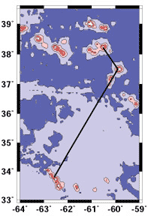| Daily Updates: May
2003 |
| S | M | T | W | T | F | S |
| |
|
|
|
1 |
2 |
3 |
| 4 |
5 |
6 |
7 |
8 |
9 |
10 |
| 11 |
12 |
13 |
14 |
15 |
16 |
17 |
| 18 |
19 |
20 |
21 |
22 |
23 |
24 |
| 25 |
26 |
27 |
28 |
29 |
30 |
31 |
| Daily Updates: June
2003 |
| S |
M |
T |
W |
T |
F |
S |
| 1 |
2 |
3 |
4 |
5 |
6 |
7 |
| 8 |
9 |
10 |
11 |
12 |
13 |
14 |
| 15 |
16 |
17 |
18 |
19 |
20 |
21 |
| 22 |
23 |
24 |
25 |
26 |
27 |
28 |
| 29 |
30 |
|
|
|
|
|


TODAY'S WEATHER
Partly Cloudy
75°F (23.9°C)
Latitude: 33° 47'N
Longitude: 62° 34'W
Wind Direction: SW
Wind Speed: 12 Knots
Sea State: 3
Sea Temperature: 75°F (23.9°C)
Swell(s) Height: 5 Foot
Barometric Pressure: 1022.0 MB
Visibility: Unrestricted

BREAKFAST
Blueberry pancakes
Assorted meats
Homefries
Scrambled eggs
Bagels
Oatmeal
Fruit
LUNCH
Lentil rice soup
Hot ham and cheddar on onion roll
Pot roast shepherd pie
Brown rice and tofu stir fry
Tuna melt on rye
Lox, tomato, onion on onion roll
Fruit
Salad bar
DINNER
Cookout!
Charcoal grilled steak, chicken, sausage
Pork and beans
Red potato salad
Corn on the cob
Cake


A map showing our course,
in black, since we left Muir Seamount Sunday. At the lower left
is
Muir. The path then goes to Rehoboth and Vogel seamounts, roughly
230 nautical miles from Muir, before ending at Manning Seamount.
Pulling up roots
June 8, 2003
By Joe Appel
It’s time to move on. Muir Seamount has
been incredibly bountiful, yielding up deep-sea treasures of
a quality and quantity we truly hadn’t expected. But there
are several other areas along the New England Seamount chain
we aim to cover, and the weather forecast for them is finally
promising.
Muir certainly sent us off with a bang. Today’s Alvin dive brought
up so many samples that the pilot, Expedition Leader Pat Hickey, radioed ahead
to ask us to fashion a net that a recovery swimmer could use to cover the collection
basket as the sub surfaced. Without that net, some of the 75 pounds – count ‘em! – of
samples might have bounced out and returned to the seafloor. (This actually happened
yesterday with a sea cucumber, except that a quick-eyed swimmer saw it go and
retrieved it.)
The haul was impressive. It included by far
the largest Desmophyllum cristagalli the scientists on
board have ever seen, as well as live fan-shaped Gorgonian corals
whose webs were so big they held 30 basket stars. Otherworldly
sponges and three different types of sea urchins rounded out
the payload.
As a bonus, the collection came from a depth range of 1,723 meters to 1,521 meters – crucial
spots to fill in if we’re to have a complete understanding of deep ocean
circulation.
Avid readers of the daily update may remember that Muir, which we’ve spent
all this time on, wasn’t supposed to take up more than a day of our time.
The winds of fate – meaning, in our case, the weather – shifted our
focus from Manning Seamount, but it turns out we’re well off for it. This
is yet more evidence that science is much more about hunting and guessing, and
even getting side-tracked, than about sticking with a single plan or solving
a problem set.
So it’s with light and hopeful hearts that we head north. Before we do,
we “pull up roots,” which is how the crew refers to the act of retrieving
transponders.
Though we originally planned to go straight to Manning Seamount, we’re planning
a slight detour due to persisting low pressure on that area. The detour will
bring us to Rehoboth Seamount at around 9 p.m. Monday night, after we pass over
Vogel Seamount for a SeaBeam survey a few hours earlier. We’re planning
on being back in Alvin dive mode by Tuesday morning, June 10.
A week or so from the end of the cruise, our plans have to emphasize flexibility
and efficiency. This is how the Chief Scientists have to think: We need to be
back in Bermuda on June 17. On our way back, on June 16, we’re going to
dive on Muir a final time. Next Sunday, the 15th, we’ll have to be in transit.
So, working backwards, that leaves five potential dives between the June 10 dive
on Rehoboth and the time when we’ll have to head south. Five dives, and
a lot of cool stuff (scientists call it “data”) we’re still hoping
to find.
[Back to top]
|





